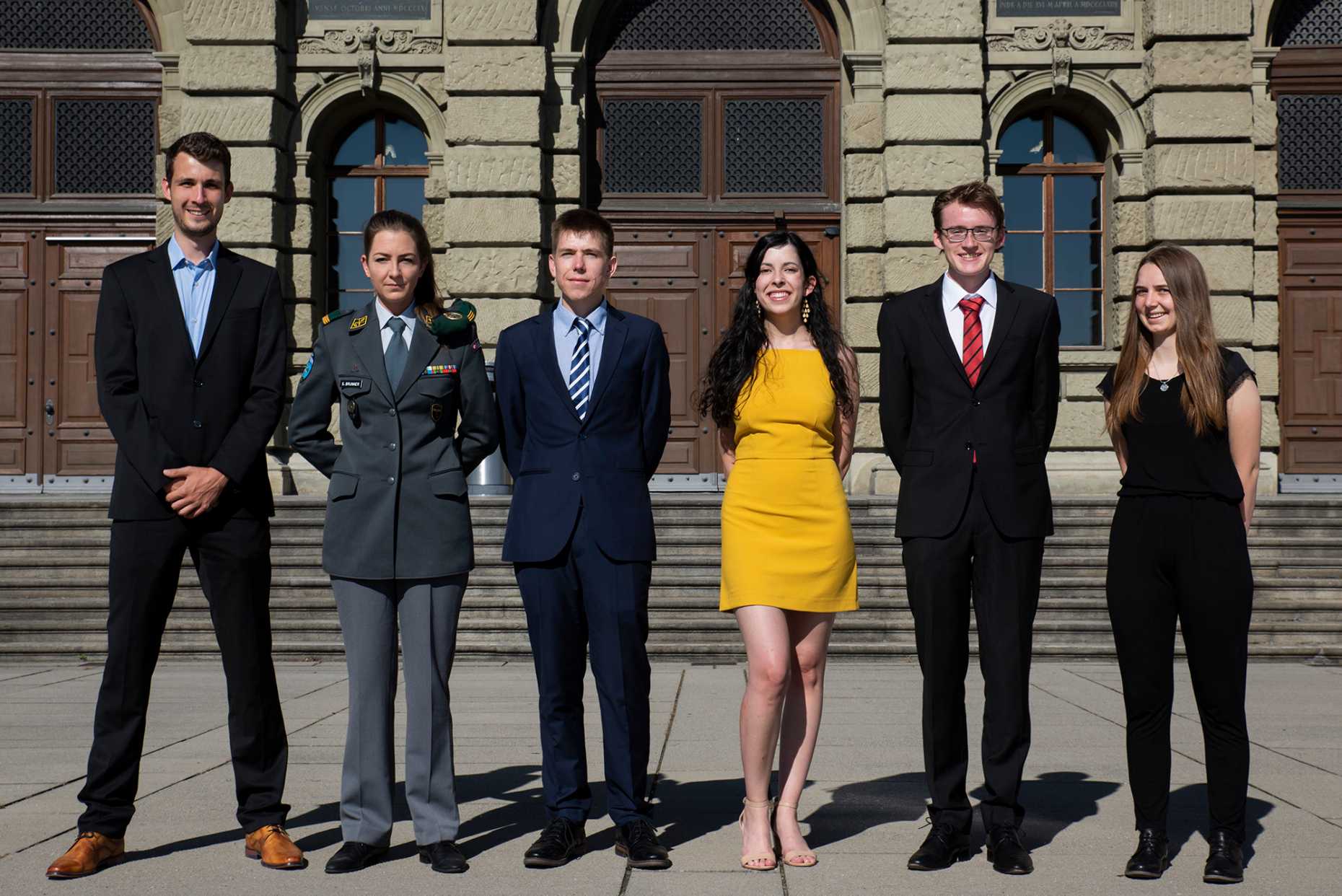Spectacular success for ETH students at the Cyber 9/12 Strategy Challenge
09.07.2020 | Anna Ettlin
Twenty international teams competed in the Cyber 9/12 Strategy Challenge 2020, including five teams from ETH Zurich. In an unprecedented winning streak, the ETH Zurich teams not only took the top five places, but also won all the special prizes. The thorough preparation by the student organisation Cyber Group was one of the reasons for their success.
A cyber attack has crippled Europe’s power grid. Large-scale blackouts, nuclear meltdowns and explosions in gas pipelines are imminent. It is not clear who is behind the attack. Meanwhile, disinformation campaigns are running on social media and international tensions are rising.
This scenario of a large-scale cyber attack was the basis for the Cyber 9/12 Strategy Challenge 2020, organised by the Geneva Centre for Security Policy. In this international competition, teams of four students face a realistically simulated cyber attack. Within two days, they must not only develop recommendations for policy makers, but also convincingly present them. Meanwhile, the scenario continues to evolve, as it would during a real attack.
Twenty student teams from all over the world competed in the 2020 challenge, which was held as an online event for the first time. Five interdisciplinary teams from ETH Zurich also participated. In recent years, the ETH teams have never been able to win first place. The competition was always too strong, especially from military academies in the USA, who not only have considerable technical expertise, but also receive professional training in teamwork and public speaking.
A well-deserved triumph
This changed on 2 and 3 July 2020. At the Cyber 9/12 Strategy Challenge 2020, the five ETH teams not only took the top five places, but also secured all the special prizes of the competition: team PromETHeus took first place, while Phoenix, Idonea and Alita took second to fourth places respectively. ARX won the “Best Team Work” award, Alita the “Best Oral Presentation” award, Phoenix the “Best Decision Document” award and the winning team PromETHeus the “Best Creative Brief” award.
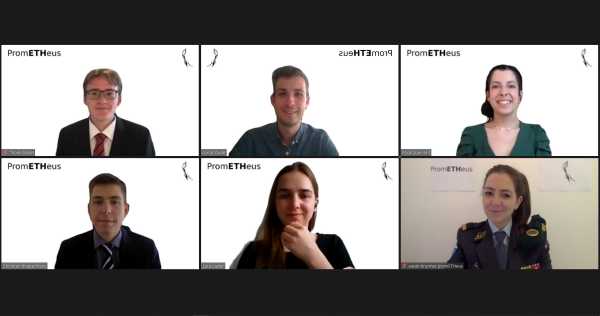
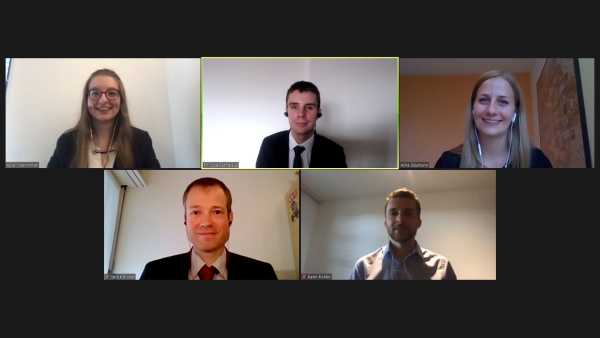
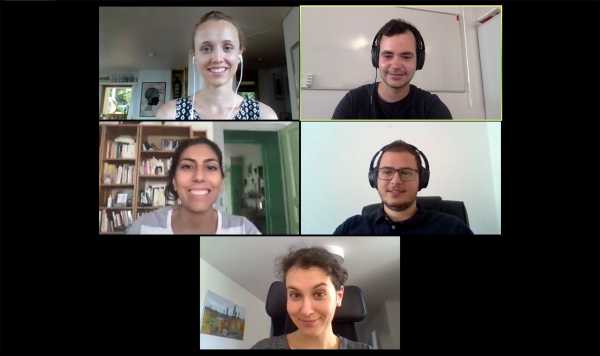
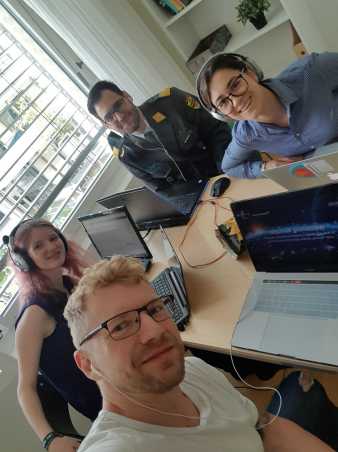
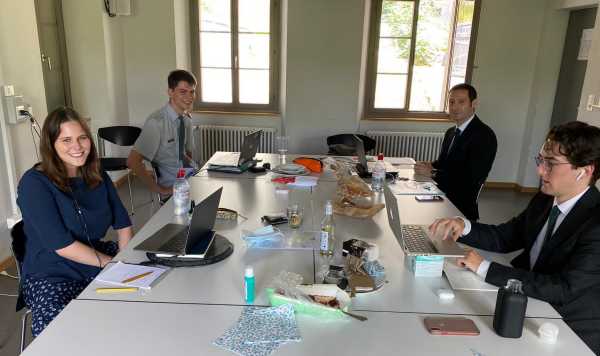
Thore Goebel (BSc Computer Science), Elisa Guerrant (MSc CybSec), Christian Knabenhans (MSc CybSec), Sarah Brunner (BA Public Policy)
Coaches: Jonas Gude, Lara Lazier
This year’s competition was once again formidable, which makes ETH’s success even more spectacular. The triumph was not down to mere luck; the ETH teams had a decisive advantage – the Cyber Group. This student organisation was founded by seven participants of the 2019 challenge to comprehensively prepare future participants from ETH Zurich for the competition.
The Cyber Group financed the teams and, from February onwards, organised weekly four-hour training sessions in which the participants were not only coached by the Cyber Group co-founders, but were also able to learn from a wide range of experts from research, industry and the public sector in areas such as cyber security and politics, as well as communication, oratory skills and team building.
“The results at this year’s Cyber 09/12 Strategy Challenge are absolutely stunning and beyond any possible hope or expectation! They are a testament to the power of the enthusiasm and initiative of our ETH students,” says Rector Sarah Springman. “At ETH, we are especially proud that these performances resulted from a student-led initiative. The Cyber Group’s enthusiasm has created a nucleus of trusted relationships in the field of cybersecurity, both at ETH and beyond, for all of the students who participated.”
The Cyber Group co-founders Karin Holzhauser and Robin Staab, Master’s students at the Department of Computer Science, are also overwhelmed by the success. “We hoped that one of our teams would make it to the finals,” says Robin Staab. “The results exceeded all our expectations.” Karin Holzhauser is delighted that so many experts were willing to give their time and knowledge to the organisation. “When curious students engage with enthusiastic risk and cyber specialists from industry, academia and public services, they inspire each other and learn from each other,” she says. “At this point, I would like to thank our numerous experts, who supported us even into the night of the challenge, as well as ETH Zurich, especially our Rector Professor Sarah Springman, Professor Kenny Paterson from the Applied Cryptography Group at the Department of Computer Science, and the team from the Center for Security Studies.”
"The results at this year’s Cyber 09/12 Strategy Challenge are absolutely stunning and beyond any possible hope or expectation! They are a testament to the power of the enthusiasm and initiative of our ETH students"Prof. Sarah Springman, Rector
The supporters of the Cyber Group commended the students’ commitment. “The performance of the ETH teams in this year’s Cyber 9/12 contest is beyond superlative,” says Professor Kenny Paterson. “This is testament to the in-depth preparation of the teams by the Cyber Group, as well as the raw talent of our ETH students.” Stefan Soesanto, Senior Researcher at the Center for Security Studies, is also impressed. “The teams showed a level of energy, creativity and thirst for knowledge that has been unrivalled in the past. They have grown throughout this journey and deservedly came out on top.”
Passion, commitment and fairness
Creativity and energy are essential qualities during the two-day challenge. The participants must process a lot of information and make quick decisions within a very tight time frame. This year, the pandemic made communication even more difficult. To minimise the risk of infection and to comply with the guidelines of ETH and the FOPH, the Cyber Group cancelled the plan to meet with all five teams in a seminar hotel in Pfäffikon. Thus, the participants had to communicate via Zoom and Slack.
The Cyber 9/12 Strategy Challenge allows teams to work with their coaches at certain times and to bring in experts from their networks. Here, too, the Cyber Group was at their side. “Some people doubted us before the event because we only use students as coaches. This very unusual in this challenge,” says Cyber Group co-founder Jelena Mihajlovic.
“The performance of the ETH teams in this year’s contest is testament to the in-depth preparation of the teams by the Cyber Group, as well as the raw talent of our ETH students."Prof. Kenny Paterson
Just how well prepared the Cyber Group was quickly became evident during the competition, for example on the evening of 2 July. “At 5:30 pm, a new scenario was announced. The simulated crisis threatened to escalate into a military confrontation between the EU and a neighbouring state. This turn of events opened up new questions,” recalls Karin Holzhauser. Together with Jelena Mihajlovic, she immediately mobilised the Cyber Group network and secured the necessary support for the teams. “At the last minute, we were able to count on the expert knowledge of cyber security specialists, ETH professors, researchers from the European Commission and officers of the Swiss Armed Forces. It was incredible!”
The Cyber Group founders were also impressed by the solidarity of the ETH teams. The outstanding performance of the ETH participants meant that four of the teams that had trained and looked forward to the challenge together suddenly found themselves having to compete against each other in the finals. As per the competition’s structure, the finalists must present their results one after another. Those who have their presentation at a later point therefore have more time to discuss final questions with their coaches. To maintain fairness, the four ETH finalists decided to end all coaching sessions at the same time.
The Cyber Group intends to celebrate its first major success with all its sponsors, experts and supporters – but not until 28 October, owing to the pandemic. “We congratulate all our teams and are incredibly proud of them,” says Karin Holzhauser. “And we would like to thank all our supporters and ETH Zurich once again, as well as the Geneva Centre for Security Policy and the Atlantic Council for the great event. We’ll be back!”
